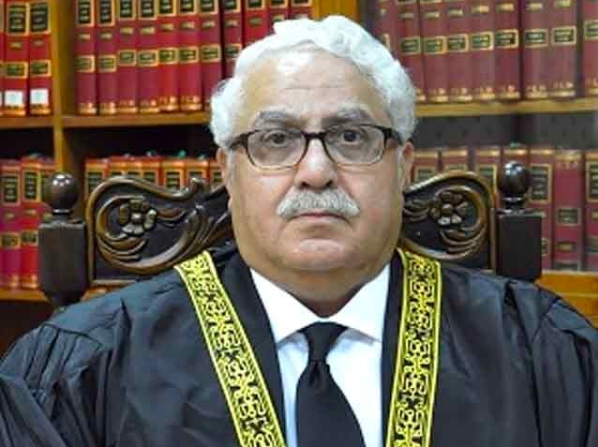ISLAMABAD: By finding former top court judge Mazahar Ali Akbar Naqvi guilty of misconduct, the Supreme Judicial Council (SJC), presided over by Chief Justice of Pakistan Qazi Faez Isa, has made legal history.

The action was taken after Naqvi had already submitted his responses to the show-cause notices that the SJC had sent him, along with his resignation as a SC judge.
On Ameer Bhatti’s retirement day, one of its members, the SJC, voiced its opinion.
On Friday, or today, Justice Sardar Tariq Masood, another member, will retire, and CJ Naeem Akhtar Afghan of the Balochistan High Court will be promoted to the Supreme Court.
Having found Naqvi guilty of misbehavior and recommending his removal, the SJC has terminated his eligibility for pension and other benefits. Many attorneys think that the SJC, bar, and administration worked together to produce the Naqvi opinion.
Following Naqvi’s resignation, the SJC desired to carry with its investigation against him.
Attorney General for Pakistan (AGP) Mansoor Awan, however, cited a Supreme Court ruling from the previous year that said the council was not allowed to take action against a retired or resigned judge.
He notified the SJC that an intra-court appeal (ICA) will be filed by the government in opposition to the ruling.
A larger bench was promptly called upon to hear the case and ruled that the SJC proceedings could not be halted, not even in the event of a respondent judge’s resignation. There is a group of lawyers who are somewhat dubious about this view.
Naqvi was being prosecuted for the second time for wrongdoing.
After Naqvi proposed taking suo motu notice on the postponement of the general elections for the assemblies of Punjab and Khyber-Pakhtunkhwa, complaints of misconduct were lodged against him.
After this suo motu notice, Naqvi’s relationship with the “powerful circles” remained difficult, unlike in the past. Additionally, he supported the faction of former CJP Umar Ata Bandial. One cannot exclude the possibility of judicial politics.
It’s also true that Naqvi was the target of serious accusations. He would have preferred to resign at the last minute rather than reply to them.
Advocate Abdul Moiz Jaferii thought there was great room for improvement in the manner Naqvi was examined and the way the evidence against him was revealed.
He did, however, add that it was evident that the former judge had engaged in numerous instances of egregious misconduct. He emphasized that they included Naqvi’s mysterious property transactions, payments made to his kids by real estate agents, and his relationships with political party officials whose cases he was presiding over.
He went on, “Naqvi should have been removed for doing whatever the establishment wanted and getting promoted to the SC in the process, for suspending the [former military ruler Pervez] Musharraf verdict, for ignoring jurisdiction when it came to the airtime ban on [MQM founder] Altaf Hussain.”
“Instead, he was punished after falling foul of forces he was aligned with in the past, for mistaking his own authority, as well as for wrongly siding with and then relying on the support of [ex-CJP] Bandial.”
Jaferii went on to say that although the former judge should have been found guilty, the timing was off.
The court has removed one of its own agents. It has drew a line in red. Count the number of people who have come across it.
The accusations made against judges of the Supreme Court and higher courts were made public, according to a statement released by the SJC, which convened on February 29 and March 1 of this year.
“A number of judges have voiced worry that responding to such charges could be interpreted as misbehavior because Article-V of the Supreme Judicial Council’s Code of Conduct, dated September 2, 2009, prohibits judges from pursuing publicity. After considering the question, the Supreme Judicial Council concluded that if a judge replies or provides clarification, it does not contravene Article V. Nonetheless, it was decided to include the following to Article-V of the Code of Conduct since judges have voiced concerns: “If an allegation is publicized against a judge, he may respond to it.” As a result, Article V of the Code of Conduct was changed to say the following: “A judge benefits from all the publicity that comes with functioning in public view.” He shouldn’t look for anything more. In particular, even if it is a legal matter, he should avoid getting involved in any public dispute, much less one centered on a political issue. However, a judge has the right to reply to any public accusations made against him.
In response to nine complaints against Naqvi, the SJC issued a ruling under Article 209(6) of the Constitution. The council felt that he ought to have been dismissed from his position as judge due to his wrongdoing.
According to attorney Hafiz Ahsaan Ahmad Khokhar, this is the first instance in the nation’s judicial history of the SJC pursuing legal action against a resigned Supreme Court judge under Article 209 of the Constitution and recommending to the president that the judge be removed for misconduct, depriving him of pension and other benefits.
Khokhar went on to say that Naqvi would likewise be regarded as a judge who had been removed from the SC.
He said that the current rulings by the SJC against one of their colleagues would establish new guidelines for judges who are accused of wrongdoing and would undoubtedly raise the bar for internal accountability and openness in the higher courts.
“Any misconduct investigation will ultimately come to a conclusion on both sides.”Khokhar went on to say that in order to restore the prestige of the nation’s judiciary, the SJC must resolve all outstanding applications in accordance with its standards regarding misbehavior brought against superior court judges and make a decision as soon as possible.










































